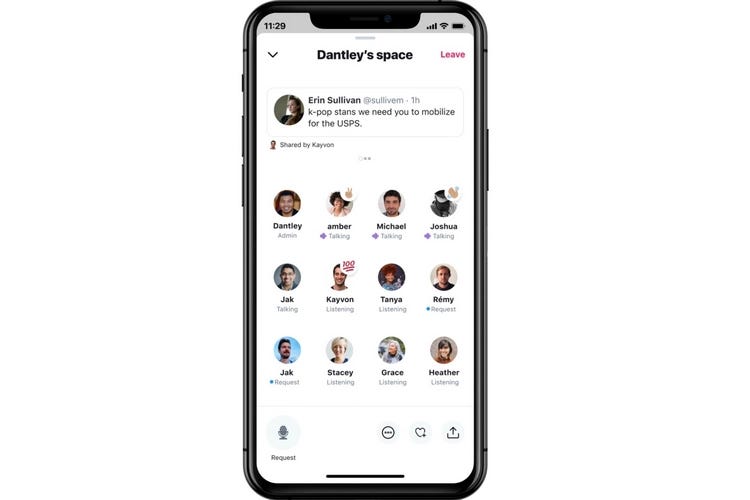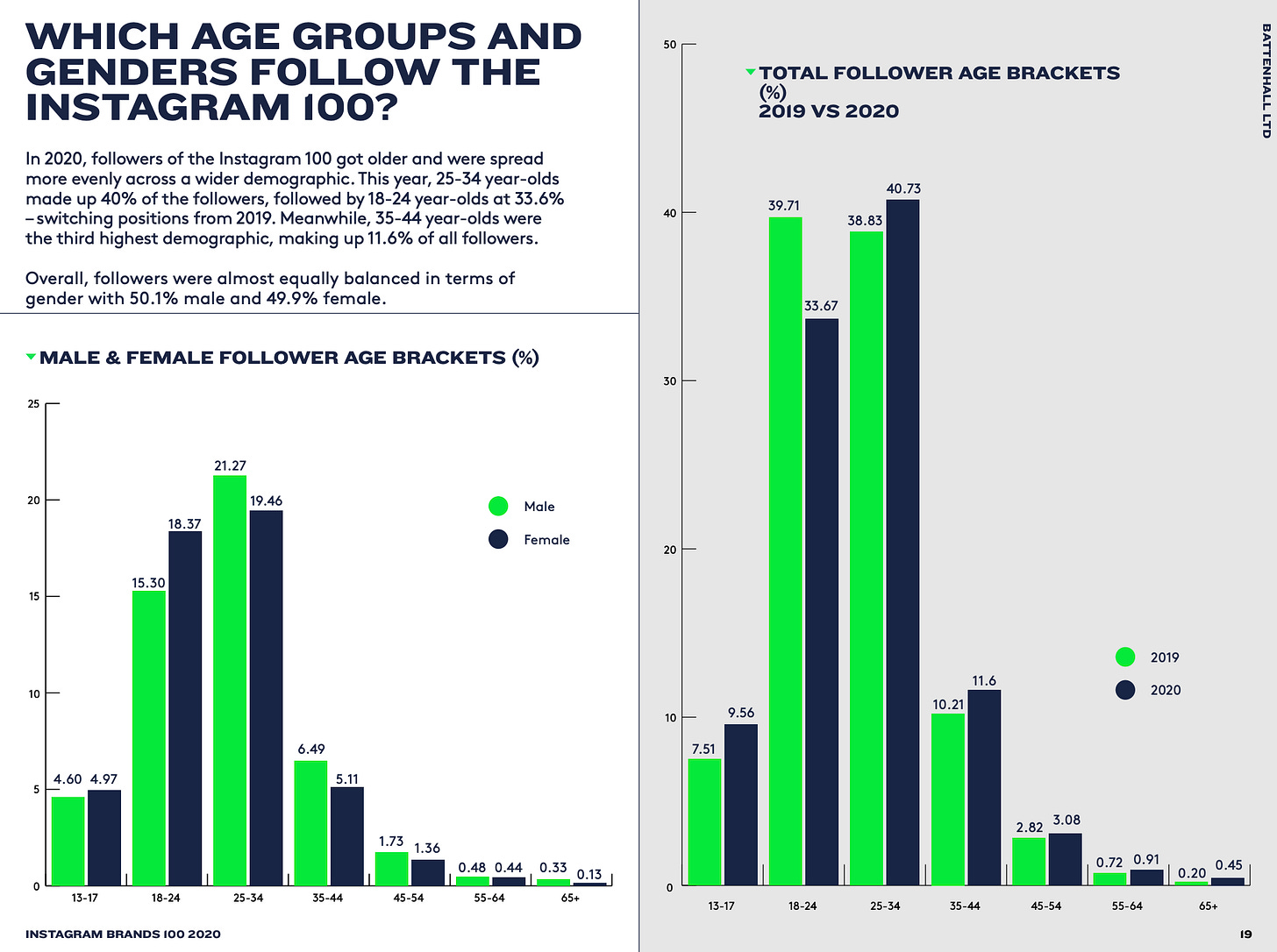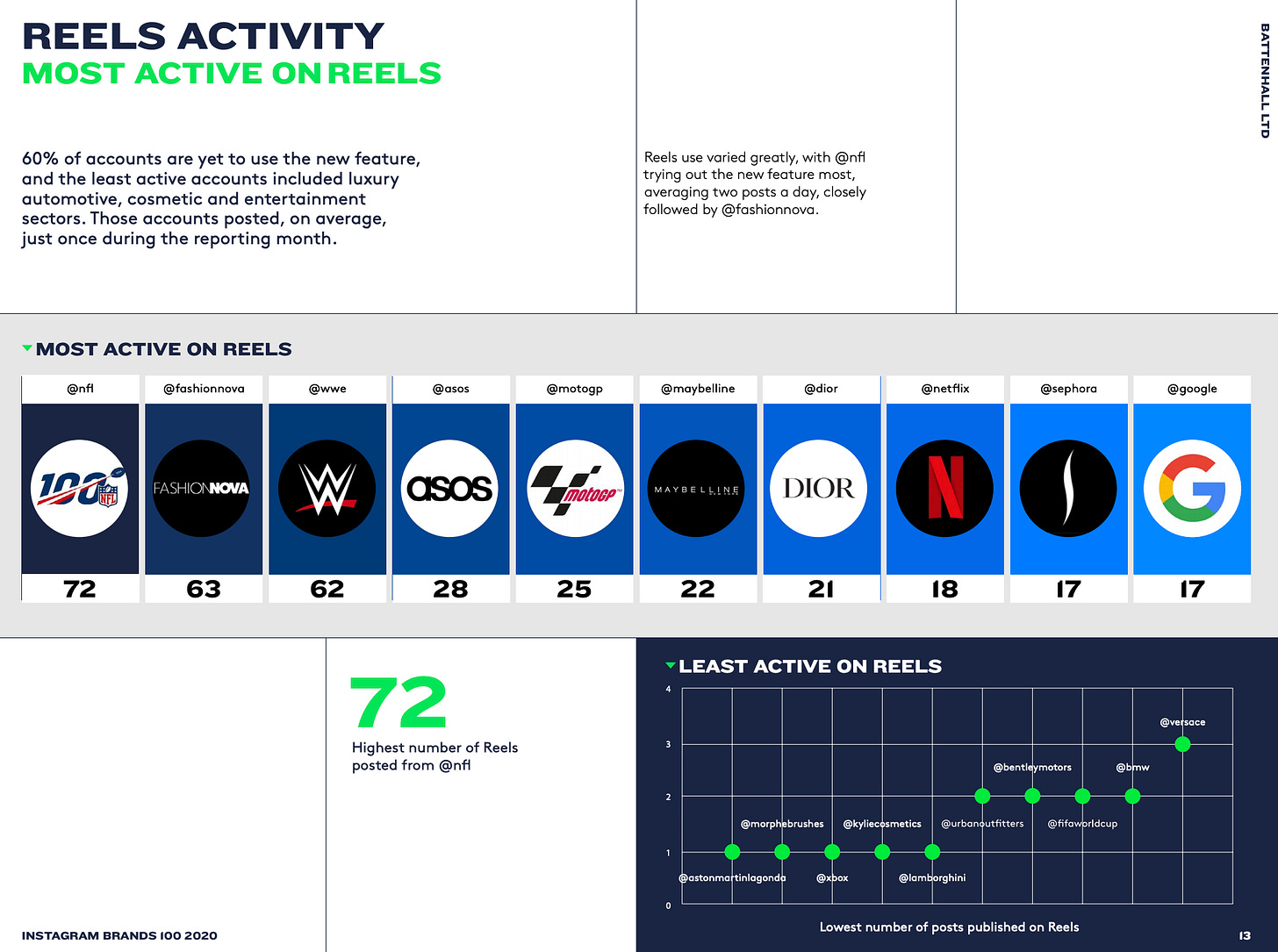The Social Media Report #11
A look at the week's news at the intersection of social media and society
Welcome to the latest edition of The Social Media Report, a review of the week’s developments in technology, digital and social media. In this edition we take a look at the growth in audio social networks with the launch of Twitter’s Spaces, new Instagram user and brand data from Battenhall, and a rundown of my must reads from this week.
Subscribe below if you’ve been sent this, and you’ll get every edition soon as it’s out.
The week in review
Voice social networks: Twitter has launched Spaces, amid the new trend for audio social networking.
Twitter this week unveiled its newest feature, Spaces, an audio social network within the social network. Creating a Space can be done like creating a post or a story / ‘Fleet’, and Spaces are either broadcast (like a podcast) or group (like a conference call or chat with a smaller network). Twitter is rolling out Spaces first in private beta.
Audio social media is one of the stand-out trends of 2020. As we fatigue from endless typing and scrolling, a range of audio offerings for social media have made an appearance, and some old ones have made a resurgence. Smart speaker use, such as Google Home and Alexa, has increased for 91% of users this year, and podcast consumption grew 29% in 2020, but the audio social networking functionality first popularised by the still not open access startup, Clubhouse, has not yet even begun to reach its full potential. This will be an important development in social media for the year ahead.
Instagram Brands 100 report: this week my colleagues launched the Battenhall Instagram Brands 100, a look at trends shaping up on the social network, through researching its biggest brand channels.
We put together this research each year, looking at a range of social networks and the way they are used. This time we have year-on-year comparisons of the Instagram user demographics, as well as how brands are using the social network’s functions, such as the feed, Stories, and the newly-launched Reels. One stand-our trend is that of an ageing demographic in general on Instagram (above right) and the growth of Reels, in particular in sport and fashion (below).
The report also has TikTok data, case studies for brands including Gymshark, Byte Squad, Xbox and the Black Country Museum. The report is available here.
My must reads from this week
On to the most interesting stories that I have been reading this week.
LinkedIn data shows city migration through the pandemic: new data 2020 shows how cities such as San Francisco and New York lost technology workers, and places such as Cleveland, and Sacramento gained them.
The growth of audio social networks: an in-depth look as Twitter and others that are flocking to audio social networking.
SolarWinds: a major story from this week was the large-scale cyber attack on western organisations and government departments, presumed from Russia, which included compromising the US nuclear weapons agency: “on Thursday, the reality of just how sprawling -- and potentially damaging -- the breach might be came into sharper focus.”
Over 3 million political Facebook ads removed: in a report from Facebook on its 2020 election activities, the social network says it took action on 265,000+ posts and 3.3 million advertising submissions, for violating voter interference policies.
Facebook runs ads criticising Apple: highly unusual attack from the social network in the shape of full page ads in US newspapers and banners in apps.
Amazon Echo group video calling: home screens get seven-way free video calls.
2021 work tech will be redesigned: Aaron Levie of Box predicts that the next wave of enterprise software will be design-led: “a couple billion people interact with software to do their work, and it can all be made so much simpler. This is the big disruption opportunity.”
India & Asia
Lite apps in India: Facebook launches another ‘lite’ app for India, this time Instagram Lite, catering for low bandwidth parts of the world.
China’s fake internet for Covid propaganda: China staged web content to give the impression of safety amid the pandemic.
TV & music
Music streaming has plateaued, social media takes over: the TikTok effect is creating a plateauing of music streaming.
Wired’s moments of 2020: a look at the shows and movies of 2020.
Space
The USA has launched the brand of its space force: called simply, Guardians, this is essentially the US Army or Navy, but for space.
UK startup Magdrive gets SpaceX investor backing: Magdrive secures £1.4m to ‘disrupt space travel.’
Interviews
Taylor Lorenz in Nieman Journalism Lab: a look into influencers vs journalists and Taylor’s prediction that in 2021 “we’ll see the dark side of this movement…”
Shopify founder interview long read: The Observer Effect, which I have linked to before when it interviewed Spoktify’s Daniel Ek, has published its third interview, this time with one of the most interesting founders in technology and commerce, Tobi Lütke. He talks a lot about culture and meetings, and has deleted all recurring meetings from his calendar, which I find interesting. Attention, Tobi says, is his most valuable commodity, so he treats it with care.
I’ll be speaking at PR and Instagram in February, tickets are £30, available here.
The Social Media Report is written by Drew Benvie, founder & CEO of Battenhall, The Drum, CIPR and GDXA’s social media consultancy of the year 2020.
You can follow The Social Media Report on Twitter at @TheSMReport.
Thank you for reading. If you have any suggestions for stories you can email them to db@battenhall.com.
And if you know someone that you think would like to read this newsletter, forward it on by clicking Share, below.




